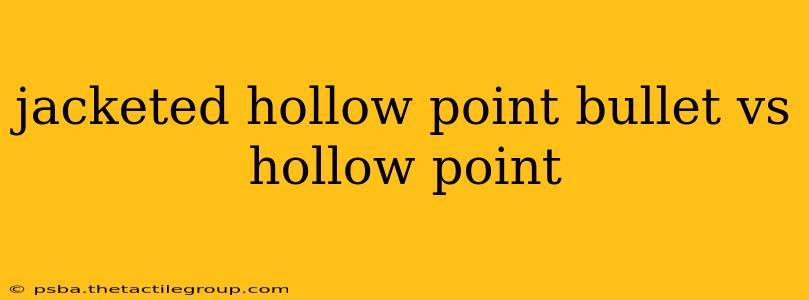Choosing the right ammunition is crucial for both target practice and self-defense. While the terms "jacketed hollow point" and "hollow point" might seem interchangeable, there are key distinctions that significantly impact ballistic performance. This article delves into the specifics, clarifying the differences and helping you make informed decisions based on your needs.
What is a Hollow Point Bullet?
A hollow point bullet (HP) features a cavity in its tip. This cavity is designed to deform upon impact, increasing the bullet's diameter and transferring more energy to the target. This increased energy transfer leads to greater stopping power, making hollow points a popular choice for self-defense. The expansion on impact also reduces the risk of overpenetration, a critical safety consideration in populated areas.
Advantages of Hollow Points:
- Increased Stopping Power: The expansion upon impact creates a larger wound cavity, resulting in more effective incapacitation of the target.
- Reduced Overpenetration: The expansion dissipates energy more quickly, lessening the chance of the bullet passing through the target and injuring bystanders.
- Greater Wound Cavity: This larger cavity contributes to faster blood loss and shock, enhancing the stopping power.
What is a Jacketed Hollow Point Bullet?
A jacketed hollow point (JHP) bullet is a type of hollow point bullet with an additional layer of metal, typically copper or copper alloy, encasing the lead core. This jacket protects the lead core from deformation during its passage down the barrel, ensuring consistent and reliable expansion upon impact. The jacket also helps reduce leading (lead buildup) in the gun barrel, promoting cleaner shooting.
Advantages of Jacketed Hollow Points:
- Improved Accuracy and Reliability: The jacket maintains the bullet's shape and integrity during firing, resulting in greater accuracy and consistent performance.
- Reduced Leading: The metal jacket minimizes lead fouling in the barrel, extending the life of your firearm and requiring less frequent cleaning.
- Controlled Expansion: JHPs are engineered for reliable expansion, unlike some fully lead hollow points which may not always deform as intended.
Jacketed Hollow Point vs. Full Metal Jacket (FMJ): A Crucial Comparison
It's important to differentiate JHPs from full metal jacket (FMJ) rounds. FMJ bullets are completely encased in a metal jacket, lacking the hollow point cavity. This design leads to significantly less expansion and considerably greater penetration. FMJs are primarily used for target practice due to their consistent trajectory and lower cost, but are generally less effective for self-defense due to their potential for overpenetration.
Choosing the Right Ammunition: Jacketed Hollow Point or Hollow Point?
For self-defense situations, jacketed hollow points are generally the preferred choice. Their reliable expansion, controlled energy transfer, and reduced overpenetration make them a safer and more effective option. While fully lead hollow points can be effective, their consistency can be less predictable. The added layer of a jacket provides significantly better performance and reliability.
However, for target practice, the choice becomes less critical. Both JHPs and HPs can be used, although FMJs are often preferred for their cost-effectiveness and consistent performance. Always check your firearm's manual to confirm the recommended ammunition type.
Conclusion
Understanding the difference between jacketed hollow points and hollow points is crucial for responsible gun ownership. While both types of ammunition are designed for expansion on impact, the jacketed variety offers improved reliability, accuracy, and better controlled expansion, making them the superior choice for self-defense applications. Always prioritize safety and legality when choosing ammunition for your firearm. Consult a firearms expert or your local gun range for personalized advice.

